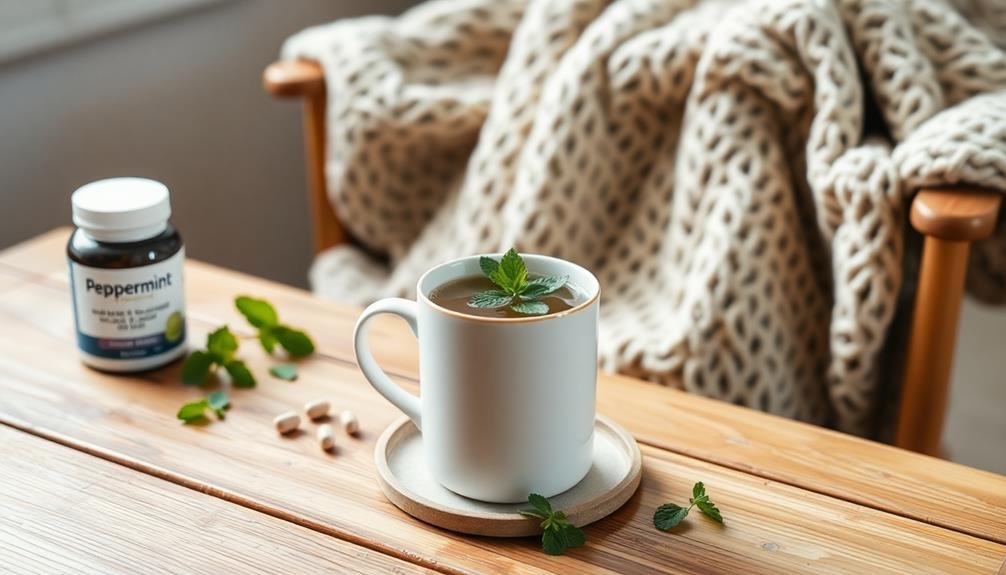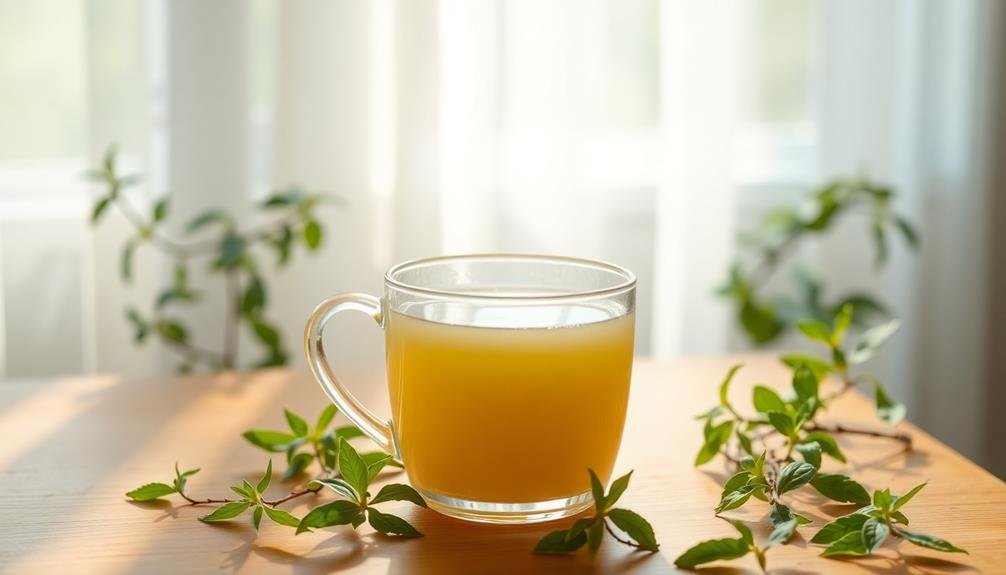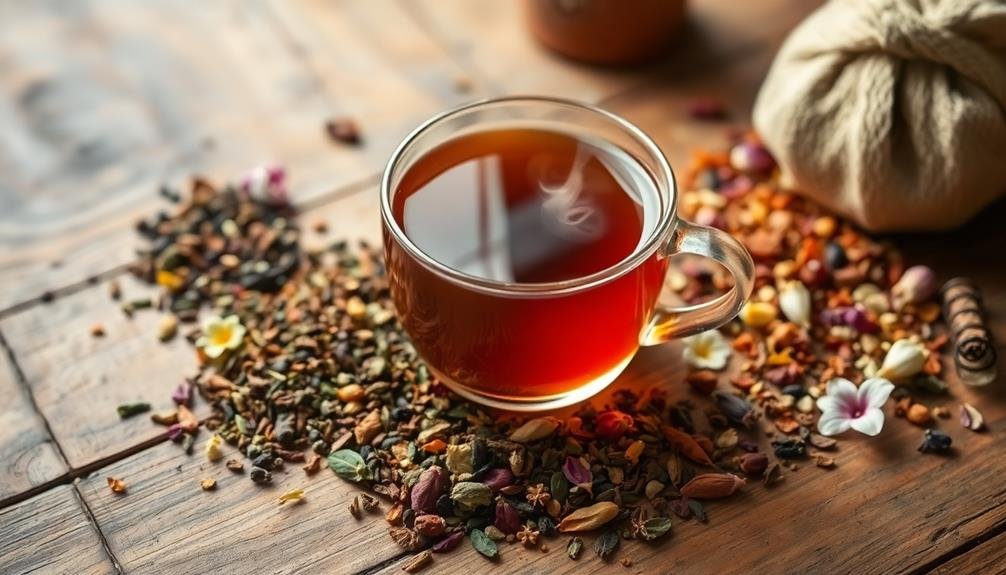While pregnant, you can safely replace chamomile tea with several delicious alternatives. Ginger tea is excellent for alleviating morning sickness and boosting your immune system. Peppermint tea can soothe nausea and reduce bloating. Rooibos, a caffeine-free option, may help with heartburn and provides essential minerals. Lemon balm offers relaxation benefits and can ease anxiety. You can even create custom blends using these safe ingredients. Remember to consult your healthcare provider before trying new herbal teas. Each of these options provides unique benefits to support your pregnancy journey, and there's much more to discover about their specific advantages.
Safety Concerns With Chamomile

While chamomile tea is often touted for its calming properties, it's best to avoid it during pregnancy. The main concern stems from chamomile's potential to stimulate uterine contractions, which could increase the risk of miscarriage or preterm labor. This risk is particularly heightened during the first trimester when your body is most sensitive to external influences.
Additionally, chamomile contains coumarin, a natural compound that can have mild anticoagulant effects. This might interfere with your blood's ability to clot normally, potentially leading to complications during pregnancy or childbirth.
Some studies also suggest that chamomile may interact with certain medications, including those commonly prescribed during pregnancy.
Moreover, there's limited research on the long-term effects of chamomile consumption during pregnancy on fetal development. While occasional use mightn't pose significant risks, it's safer to err on the side of caution.
Ginger Tea Benefits
Ginger tea frequently tops the list of recommended pregnancy-safe beverages, and for good reason. It's packed with benefits that can ease many common pregnancy discomforts. You'll find that ginger tea can help alleviate morning sickness and nausea, which often plague expectant mothers during the first trimester.
Beyond its anti-nausea properties, ginger tea can also aid in digestion and reduce bloating, issues you might face as your pregnancy progresses. It's known to have anti-inflammatory effects, which can help soothe sore muscles and joints. You'll appreciate this as your body adapts to carrying extra weight.
Ginger tea may also boost your immune system, helping you ward off colds and flu. This is particularly important during pregnancy when your immune system is naturally suppressed. Additionally, it can improve circulation, potentially reducing swelling in your feet and ankles.
While ginger tea is generally safe, you should still consume it in moderation. Aim for no more than 1 gram of ginger per day, which is about one cup of strong ginger tea.
Always consult your healthcare provider before adding any new herbal teas to your diet during pregnancy.
Peppermint Tea for Nausea Relief

Another excellent option for managing pregnancy-related nausea is peppermint tea. This invigorating beverage has been used for centuries to soothe upset stomachs and reduce queasiness. When you're dealing with morning sickness or general nausea during pregnancy, a cup of peppermint tea can provide quick relief.
Peppermint tea works by relaxing the muscles in your digestive tract, which can help alleviate feelings of nausea and prevent vomiting. It's also known to reduce bloating and gas, common pregnancy discomforts. You'll find that peppermint tea is caffeine-free, making it a safe choice throughout your pregnancy.
To prepare peppermint tea, steep fresh peppermint leaves or a tea bag in hot water for 5-7 minutes. You can drink it hot or cold, depending on your preference. For an extra boost, try adding a slice of lemon or a touch of honey.
While peppermint tea is generally considered safe during pregnancy, it's always best to consult with your healthcare provider before incorporating any new herbal teas into your diet. They can advise you on the appropriate amount to consume and any potential interactions with medications you may be taking.
Rooibos: Caffeine-Free Alternative
For those in search of a caffeine-free alternative to chamomile, rooibos tea stands out as an excellent choice during pregnancy. This South African herbal tea is naturally caffeine-free and packed with antioxidants, making it a safe and beneficial option for expectant mothers.
Rooibos, also known as "red bush" tea, offers a smooth, slightly sweet flavor that's easy on the palate. It's rich in polyphenols, which may help reduce inflammation and boost your immune system.
During pregnancy, you'll appreciate its potential to alleviate heartburn and acid reflux, common discomforts in the later trimesters.
You can enjoy rooibos hot or iced, and it's versatile enough to blend with other pregnancy-safe herbs or fruits for added flavor. It's also a good source of minerals like calcium and manganese, which support fetal bone development.
Unlike some herbal teas, rooibos doesn't contain compounds that might stimulate uterine contractions or interfere with iron absorption.
When selecting rooibos, opt for organic varieties to avoid potential pesticide exposure. As with any new addition to your pregnancy diet, it's wise to consult your healthcare provider before making rooibos a regular part of your routine.
Lemon Balm for Relaxation

As your pregnancy progresses, you might find yourself seeking a calming alternative to chamomile tea. Lemon balm, a member of the mint family, offers a soothing option that's generally considered safe for expectant mothers. This herb has been used for centuries to promote relaxation and reduce stress.
You'll appreciate lemon balm's mild, lemony flavor and its potential to ease anxiety and improve sleep quality. It's rich in antioxidants and may help alleviate digestive discomfort, a common pregnancy complaint. To prepare lemon balm tea, steep 1-2 teaspoons of dried leaves in hot water for 5-10 minutes.
While lemon balm is typically safe, it's essential to consume it in moderation during pregnancy. Excessive intake might lead to mild side effects like headaches or nausea. Always consult your healthcare provider before adding any new herbal tea to your diet, as individual circumstances may vary.
You can find lemon balm tea in most health food stores or online retailers. For a revitalizing twist, try combining it with other pregnancy-safe herbs like peppermint or ginger.
Remember to stay hydrated and enjoy this calming beverage as part of a balanced prenatal diet.
Creating Custom Pregnancy-Safe Blends
With a little creativity, you can craft your own pregnancy-safe tea blends at home. Experiment with various herbs and flavors to find combinations that suit your taste and provide the benefits you're seeking. Start with a base of rooibos or ginger, then add other pregnancy-safe ingredients to customize your blend.
Here's a table to inspire your custom tea creations:
| Base Tea | Complementary Ingredients |
|---|---|
| Rooibos | Vanilla, cinnamon, orange |
| Ginger | Lemon, honey, mint |
| Peppermint | Spearmint, lemongrass |
When creating your blends, remember to use only pregnancy-safe herbs and ingredients. Stick to small amounts of each component and avoid using anything you're unsure about. It's always best to consult with your healthcare provider before trying new herbal teas during pregnancy.
To make your custom blend, mix the dry ingredients in a jar or tea tin. Use about 1 teaspoon of the mixture per cup of hot water and steep for 5-7 minutes. You can adjust the proportions to suit your taste preferences. Don't be afraid to get creative and try different combinations until you find your perfect pregnancy-safe tea blend.
Frequently Asked Questions
Can I Drink Herbal Teas Throughout All Trimesters of Pregnancy?
You can enjoy many herbal teas during pregnancy, but it's essential to be cautious. Some are safe throughout all trimesters, while others should be avoided. Always consult your healthcare provider before adding new teas to your diet.
How Many Cups of Herbal Tea Are Safe to Consume Daily?
You should limit your herbal tea intake to 2-3 cups daily during pregnancy. It's best to consult your healthcare provider, as some herbs can be harmful. Stick to well-known, pregnancy-safe teas and don't overindulge.
Are There Any Teas That Can Help Induce Labor Naturally?
While some teas like red raspberry leaf, evening primrose, and nettle are believed to help induce labor, you shouldn't rely on them without medical advice. Always consult your doctor before trying any natural methods to start labor.
Can I Drink Cold-Brewed Herbal Teas During Pregnancy?
You can safely drink cold-brewed herbal teas during pregnancy, but be cautious. Stick to caffeine-free options and avoid herbs that aren't pregnancy-safe. Always consult your healthcare provider before introducing new teas into your diet while pregnant.
Are There Any Herbal Teas That Can Help With Pregnancy-Related Insomnia?
You can try several herbal teas to help with pregnancy-related insomnia. Lemon balm, valerian root, and passionflower are known for their calming effects. However, always consult your doctor before consuming any herbal teas during pregnancy.
In Summary
You've got plenty of safe, tasty options to replace chamomile during pregnancy. Try ginger tea for a spicy kick, peppermint to soothe your stomach, or rooibos for a caffeine-free treat. Don't forget about calming lemon balm or creating your own custom blends. Always check with your doctor before trying new teas, and enjoy exploring these flavorful alternatives. You'll find a new favorite in no time while keeping yourself and your baby safe.





Leave a Reply